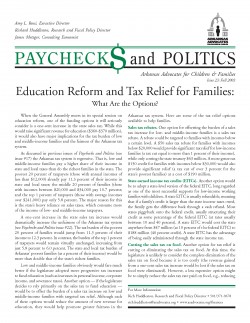
When the General Assembly meets in its special session on education reform, one of the funding options it will seriously consider is a one-cent increase in the state sales tax. While this would raise significant revenue for education ($360-$370 million), it would also have major implications for the tax burden of low and middle-income families and the fairness of the Arkansas tax system.
As discussed in previous issues of Paychecks and Politics (see issue #17) the Arkansas tax system is regressive. That is, low and middle-income families pay a higher share of their income in state and local taxes than do the richest families in the state. The poorest 20 percent of taxpayers (those with annual incomes of less than $12,000) already pay 11.3 percent of their income in state and local taxes; the middle 20 percent of families (those with incomes between $20,000 and $34,000 pay 10.7 percent; and the top 1 percent of taxpayers (those with average incomes over $241,000) pay only 5.8 percent. The major reason for this is the state’s heavy reliance on sales taxes, which consume more of the income of low- and middle-income taxpayers.
A one-cent increase in the state sales tax increase would dramatically increase the unfairness of the Arkansas tax system (see Paychecks and Politics issue #22). The tax burden of the poorest 20 percent of families would jump from 11.3 percent of their income to 12.3 percent. In contrast, the burden of the top 1 percent of taxpayers would remain virtually unchanged, increasing from just 5.8 percent to 6.0 percent. The state and local tax burden of Arkansas’ poorest families (as a percent of their income) would be more than double that of the state’s richest families.
Low and middle-income families obviously would fare much better if the legislature adopted more progressive tax increases to fund education (such as increases in personal income, corporate income, and severance taxes). Another option — if the legislature decides to rely primarily on the sales tax to fund education — would be to offset the burden of a sales tax increase on low and middle-income families with targeted tax relief. Although each of these options would reduce the amount of new revenue for education, they would help promote greater fairness in the Arkansas tax system. Here are some of the tax relief options available to help families.
